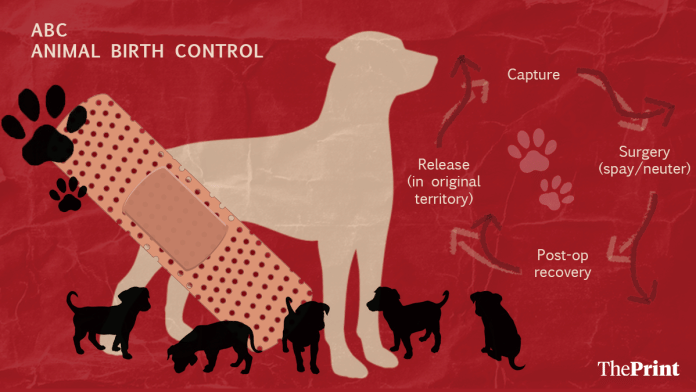New Delhi: Harassing or obstructing responsible community dog feeders is a “serious offence”, no stray dog to be relocated or killed, permanent housing for habitually aggressive dogs, and a 24×7 helpline to receive complaints related to dog bites, suspected rabies, and implementation of the Animal Birth Control (ABC) programme.
The Delhi government has come up with an elaborate set of guidelines for stray dog population management, rabies eradication, and mitigating human-stray dog conflict, less than a month after the Supreme Court’s stray dogs order.
Issued by the Delhi Department of Urban Development, in line with the Animal Birth Control Rules 2023 and the revised module of the Animal Welfare Board of India (AWBI) which outlines ABC protocol, the guidelines outline a standard course of action and define the responsibilities of each stakeholder involved in animal care.
Here are key takeaways from the government notification:
‘Power back-up, CCTVs for all ABC centres’
The guidelines state that the Delhi ABC programme is “the responsibility” of the Municipal Corporation of Delhi (MCD), the New Delhi Municipal Council (NDMC) and Delhi Cantonment Board (DCB).
Local authorities must engage only with those Animal Welfare Organisations (AWOs) that are recognised by the AWBI. The guidelines state that they must also ensure that all veterinarians, dog handlers and para-veterinary staff are trained.
Local authorities must also ensure ABC centres have adequate infrastructure, including enough kennels, operation theatres with power backup, transport vans, incineration or deep burial facilities, CCTVs with 30-day recording, and regular maintenance, and that detailed records of catching, release, sterilisation, vaccination, feeding and medicines are maintained.
Authorities must reimburse sterilisation and vaccination costs based on organ counts, constitute Local ABC Monitoring Committees that meet monthly to review progress and address complaints, and act on violations by suspending or terminating defaulting AWOs.
Currently, Delhi has 20 ABC centres.
They are also required to collect monthly progress reports and submit annual reports by 31 May to the AWBI through the State ABC Monitoring Committee, verify sterilisation figures through periodic organ counts, ensure that no street dog is relocated or killed, and oversee strict compliance with the ABC Rules 2023 and the Revised Module.
Feeders and feeding spots
The new guidelines also state that harassing, threatening or obstructing any individual from responsibly feeding stray dogs, particulary women, senior citizens or community caregivers is a “serious offence” and will invite “strict legal action”.
In line with the Supreme Court’s directions, RWAs and residents have to designate feeding points in each ward, keeping the territorial nature of dogs in mind and ensuring these spots are away from areas frequented by children and the elderly.
Feeding points are to be marked with signboards, keeping in mind the number of dogs and spatial distribution. Feeders must keep these spots clean, dispose of leftover food safely, and are encouraged to assist in sterilisation and vaccination drives.
Any disputes over feeding spots will be decided by the Rule 20 committee, which includes the chief veterinary officer or their representative, a representative of the jurisdictional police, a representative of the District Society for Prevention of Cruelty to Animals or the State Board, a representative of a recognised AWO conducting Animal Birth Control, and a veterinary officer deputed by the local authority.
Despite this, if any party involved in the dispute is not satisfied, they may take the matter to the Delhi Animal Welfare Board, which last week held its first meeting with a minister present after a gap of two years.
Pet ownership, rabies management
The guidelines mandate registration of all pet dogs over three months of age with the local body, valid for one year and contingent on up-to-date anti-rabies vaccination.
Pet dogs will be registered under two categories—breeding and non-breeding.
Breeding will only be allowed in commercial areas, with owners required to produce a declaration of compliance with the Prevention of Cruelty to Animals (Dog Breeding and Marketing) Rules, 2017, and a registration certificate from the Delhi Animal Welfare Board.
Non-breeding dogs must be surgically sterilised after one year of age. Annual vaccination certificates are mandatory for all registered dogs, and owners must provide details such as gender, colour, breed and date of rabies vaccination.
Residents adopting Indian dogs will be exempt from registration fees and provided free sterilisation and first vaccination at their area’s ABC centre.
At the heart of the stray dog debate was also the management of aggressive dogs, which experts say are most often linked to dog-bite incidents.
The guidelines state that dogs suspected to be rabid or showing violent behaviour must be carefully captured and kept under observation at ABC or dog care centres.
Rabid dogs are to be isolated until natural death, with carcasses disposed of scientifically. Non-rabid dogs, in line with Rule 16 of the ABC Rules 2023, must be sterilised, vaccinated against rabies, and released at the place of capture.
To address cases of habitually aggressive dogs, municipal bodies may empanel AWBI-recognised private shelters with space for their permanent housing. The guidelines also stress that no cruelty shall be used during catching, which must be done only by trained handlers, with proper training provided to all dog catchers.
The local authorities are also encouraged to run public awareness campaigns with schools, NGOs and animal caregivers to educate people on dog behaviour, humane conduct, and the need for sterilisation, vaccination and feeding of street dogs.
Each local authority are also asked to set up a 24×7 helpline and an online portal to receive complaints related to dog bites, suspected rabies, and ABC programme implementation
A Complaint Control Cell will have to maintain records of all complaints and their resolution, and anyone aggrieved by the action or decision of the local authority may appeal to the ABC State Monitoring Committee.
(Edited by Gitanjali Das)






